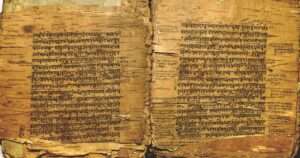1
At the end of Dvapara-yuga Narada approached Brahma and asked,
“O glorious one, how can I cross beyond the Kali-yuga as I wander over the earth?”
Brahma replied,
“The question you have asked me is excellent. Please listen to this answer, which is very confidential and contains the secret of all the Vedas, an answer that will enable you to transcend the world of birth and death in the age of Kali.
Simply by chanting aloud the mantra of the holy names of Lord Narayana, the Supreme Personality of Godhead, one shakes away the age of Kali.”
2
Narada again asked,
“What is that holy name?”
Brahma replied,
“The sixteen words of the Hare Krishna mantra:
Hare Krishna, Hare Krishna,
Krishna Krishna, Hare Hare,
Hare Rama, Hare Rama,
Rama Rama, Hare Hare,
are especially meant for counteracting the sins of the age of Kali.
To save oneself from the contamination of this age there is no alternative but to chant the Hare Krishna mantra.
After searching through all the Vedic literatures one cannot find a method of religion for this age so sublime as the chanting of Hare Krishna.
The sixteen words of the maha-mantra destroy the illusions that cover the conditioned soul.
This mantra makes the Supreme Personality of Godhead Himself appear as the brilliant sun appears when a host of clouds are dispersed.”
3
Again Narada asked,
“O glorious one, what are the rules for chanting this mantra?”
Brahma replied,
“There are no rules.
Even if he is impure, a devotee who chants this mantra becomes pure. He attains the kinds of liberation known as salokya, samipya, sarupya and sayujya.
One who chants these sixteen names forty five million times becomes free of the sin of killing a brahmana.
He becomes free from the sin of killing a ksatriya.
He becomes purified of the sin of stealing gold.
He becomes purified of the sin of approaching a vrisali woman[1].
He becomes purified of the sin of insulting pitas, demigods, or human beings.
He is at once purified of the sin of abandoning all religious duties.
At once he becomes liberated.
Thus says the Upanisad[2].
[1] A sudra woman, low class.
[2] Note: Kalisantarana Upanisad is a section of the Yajur Veda.
This is a section of the book “Brilliant as the Sun”.
To buy the complete book, click above
Post view 1180 times




Leave a Reply